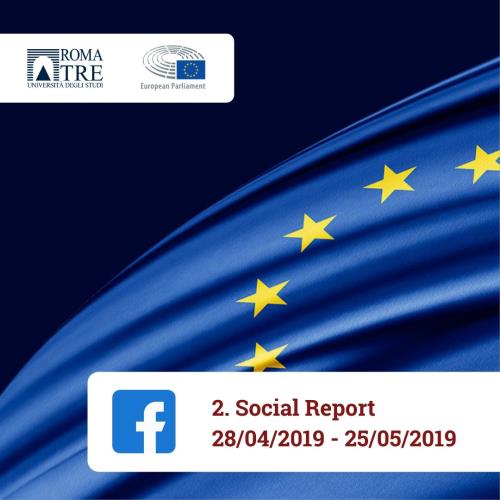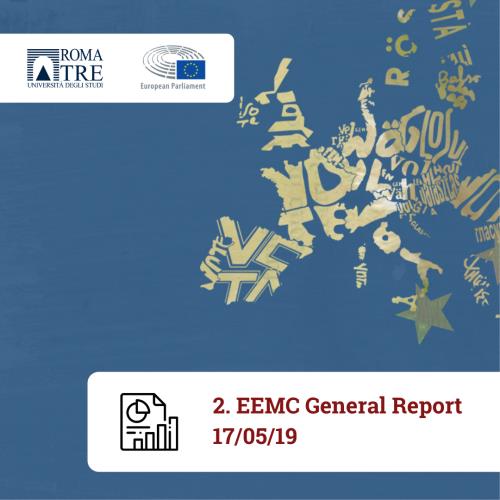Country report: UNITED KINGDOM
28/04/19 - 20/05/19
The "Country report: UNITED KINGDOM" has been based upon data gathered from 28/04/2019 to 15/05/2019.
Chart n°1 - Content typology
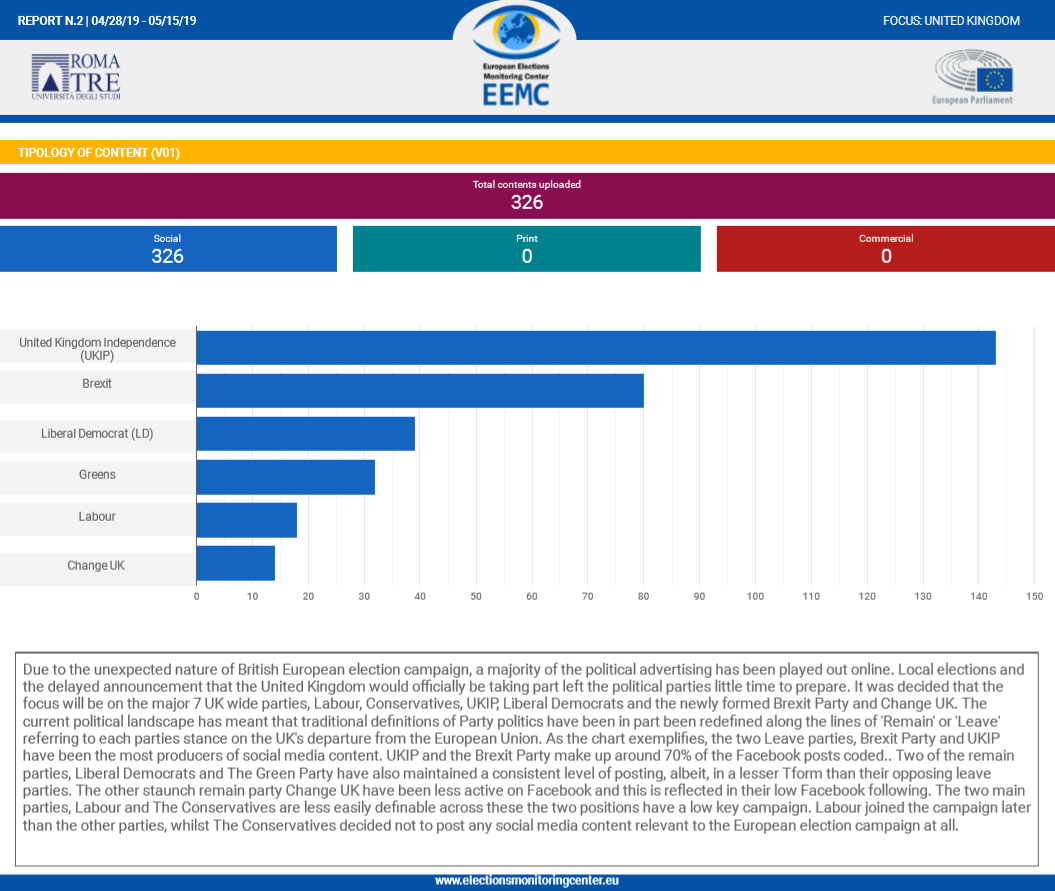
Due to the unexpected nature of British European election campaign, a majority of the political advertising has been played out online. Local elections and the delayed announcement that the United Kingdom would officially be taking part left the political parties little time to prepare. It was decided that the focus will be on the major 7 UK wide parties, Labour, Conservatives, UKIP, Liberal Democrats and the newly formed Brexit Party and Change UK. The current political landscape has meant that traditional definitions of Party politics have been in part been redefined along the lines of 'Remain' or 'Leave' referring to each parties stance on the UK's departure from the European Union. As the chart exemplifies, the two Leave parties, Brexit Party and UKIP have been the most producers of social media content. UKIP and the Brexit Party make up around 70% of the Facebook posts coded.. Two of the remain parties, Liberal Democrats and The Green Party have also maintained a consistent level of posting, albeit, in a lesser Tform than their opposing leave parties. The other staunch remain party Change UK have been less active on Facebook and this is reflected in their low Facebook following. The two main parties, Labour and The Conservatives are less easily definable across these the two positions have a low key campaign. Labour joined the campaign later than the other parties, whilst The Conservatives decided not to post any social media content relevant to the European election campaign at all.
Chart n°2 - Focus
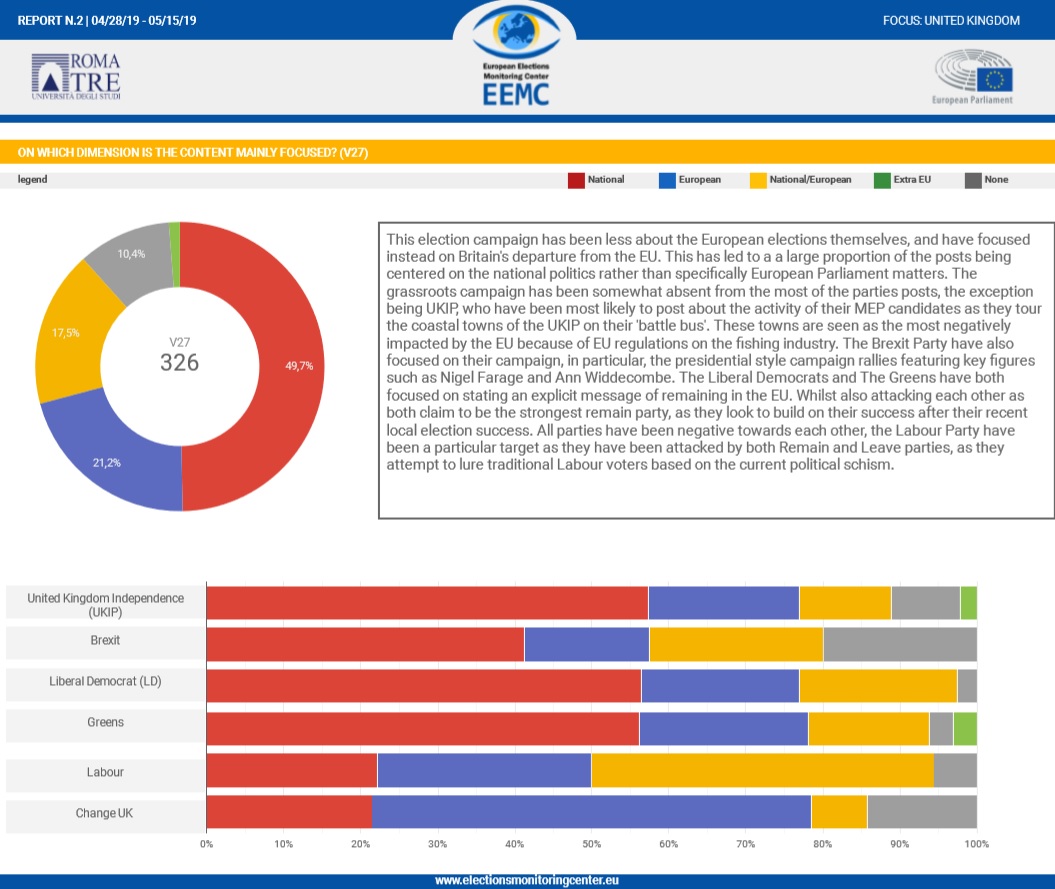
This election campaign has been less about the European elections themselves, and have focused instead on Britain's departure from the EU. This has led to a a large proportion of the posts being centered on the national politics rather than specifically European Parliament matters. The grassroots campaign has been somewhat absent from the most of the parties posts, the exception being UKIP, who have been most likely to post about the activity of their MEP candidates as they tour the coastal towns of the UKIP on their 'battle bus'. These towns are seen as the most negatively impacted by the EU because of EU regulations on the fishing industry. The Brexit Party have also focused on their campaign, in particular, the presidential style campaign rallies featuring key figures such as Nigel Farage and Ann Widdecombe. The Liberal Democrats and The Greens have both focused on stating an explicit message of remaining in the EU. Whilst also attacking each other as both claim to be the strongest remain party, as they look to build on their success after their recent local election success. All parties have been negative towards each other, the Labour Party have been a particular target as they have been attacked by both Remain and Leave parties, as they attempt to lure traditional Labour voters based on the current political schism.
Chart n°3 - How is Europe represented?
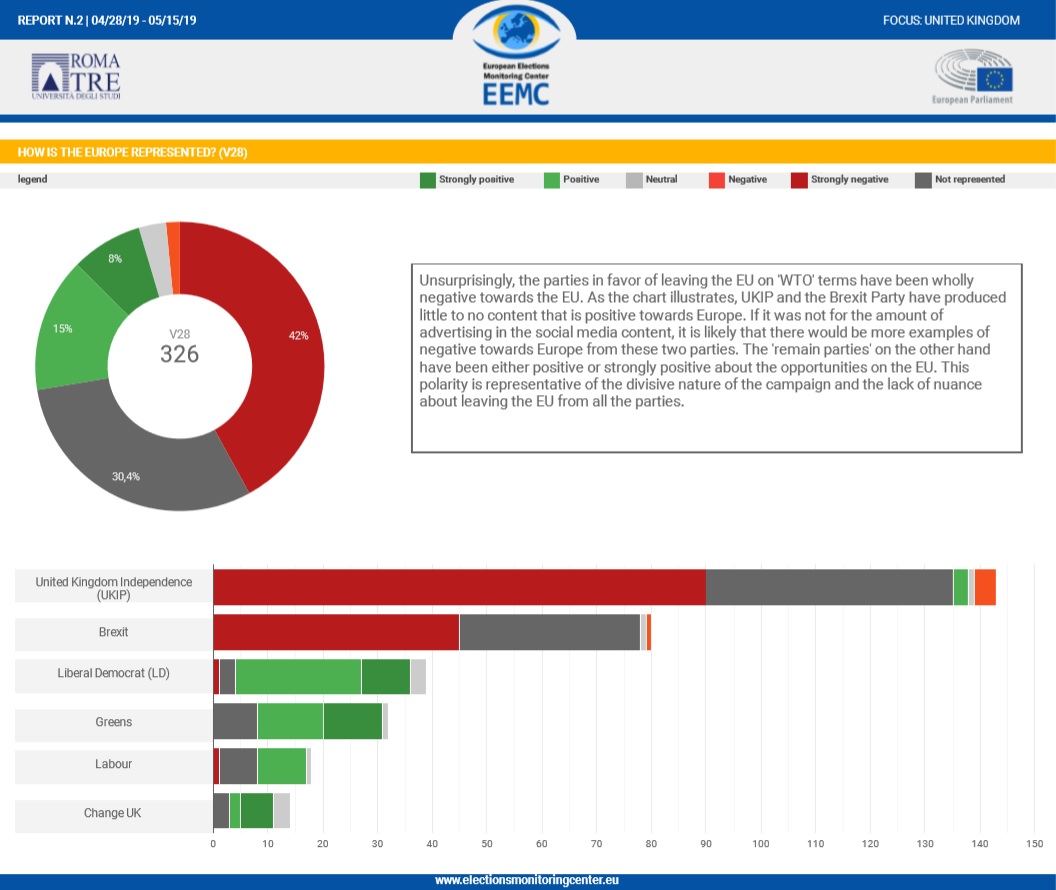
Unsurprisingly, the parties in favor of leaving the EU on 'WTO' terms have been wholly negative towards the EU. As the chart illustrates, UKIP and the Brexit Party have produced little to no content that is positive towards Europe. If it was not for the amount of advertising in the social media content, it is likely that there would be more examples of negative towards Europe from these two parties. The 'remain parties' on the other hand have been either positive or strongly positive about the opportunities on the EU. This polarity is representative of the divisive nature of the campaign and the lack of nuance about leaving the EU from all the parties.
Chart n°4 - Rational, emotional or neutral?
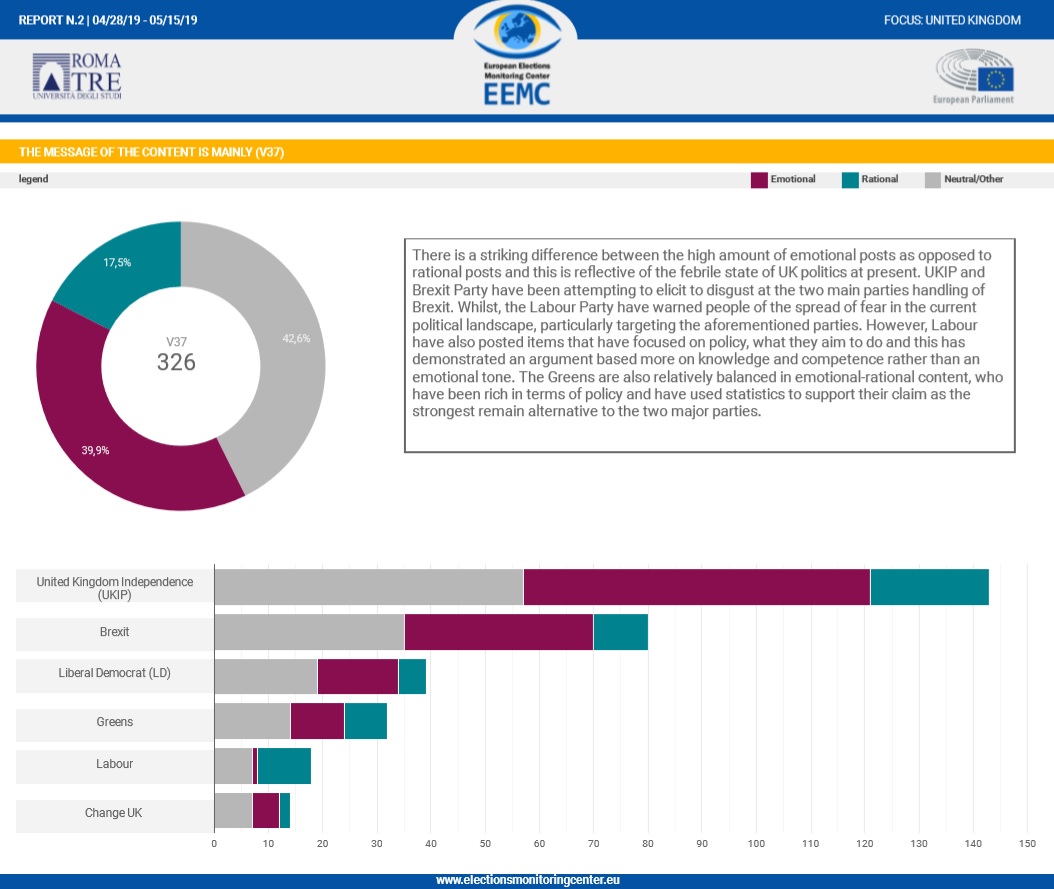
There is a striking difference between the high amount of emotional posts as opposed to rational posts and this is reflective of the febrile state of UK politics at present. UKIP and Brexit Party have been attempting to elicit to disgust at the two main parties handling of Brexit. Whilst, the Labour Party have warned people of the spread of fear in the current political landscape, particularly targeting the aforementioned parties. However, Labour have also posted items that have focused on policy, what they aim to do and this has demonstrated an argument based more on knowledge and competence rather than an emotional tone. The Greens are also relatively balanced in emotional-rational content, who have been rich in terms of policy and have used statistics to support their claim as the strongest remain alternative to the two major parties.
To download the "Country report: UNITED KINGDOM" in pdf format:

Due to the unexpected nature of British European election campaign, a majority of the political advertising has been played out online. Local elections and the delayed announcement that the United Kingdom would officially be taking part left the political parties little time to prepare. It was decided that the focus will be on the major 7 UK wide parties, Labour, Conservatives, UKIP, Liberal Democrats and the newly formed Brexit Party and Change UK. The current political landscape has meant that traditional definitions of Party politics have been in part been redefined along the lines of 'Remain' or 'Leave' referring to each parties stance on the UK's departure from the European Union. As the chart exemplifies, the two Leave parties, Brexit Party and UKIP have been the most producers of social media content. UKIP and the Brexit Party make up around 70% of the Facebook posts coded.. Two of the remain parties, Liberal Democrats and The Green Party have also maintained a consistent level of posting, albeit, in a lesser Tform than their opposing leave parties. The other staunch remain party Change UK have been less active on Facebook and this is reflected in their low Facebook following. The two main parties, Labour and The Conservatives are less easily definable across these the two positions have a low key campaign. Labour joined the campaign later than the other parties, whilst The Conservatives decided not to post any social media content relevant to the European election campaign at all.
Chart n°2 - Focus

This election campaign has been less about the European elections themselves, and have focused instead on Britain's departure from the EU. This has led to a a large proportion of the posts being centered on the national politics rather than specifically European Parliament matters. The grassroots campaign has been somewhat absent from the most of the parties posts, the exception being UKIP, who have been most likely to post about the activity of their MEP candidates as they tour the coastal towns of the UKIP on their 'battle bus'. These towns are seen as the most negatively impacted by the EU because of EU regulations on the fishing industry. The Brexit Party have also focused on their campaign, in particular, the presidential style campaign rallies featuring key figures such as Nigel Farage and Ann Widdecombe. The Liberal Democrats and The Greens have both focused on stating an explicit message of remaining in the EU. Whilst also attacking each other as both claim to be the strongest remain party, as they look to build on their success after their recent local election success. All parties have been negative towards each other, the Labour Party have been a particular target as they have been attacked by both Remain and Leave parties, as they attempt to lure traditional Labour voters based on the current political schism.
Chart n°3 - How is Europe represented?

Unsurprisingly, the parties in favor of leaving the EU on 'WTO' terms have been wholly negative towards the EU. As the chart illustrates, UKIP and the Brexit Party have produced little to no content that is positive towards Europe. If it was not for the amount of advertising in the social media content, it is likely that there would be more examples of negative towards Europe from these two parties. The 'remain parties' on the other hand have been either positive or strongly positive about the opportunities on the EU. This polarity is representative of the divisive nature of the campaign and the lack of nuance about leaving the EU from all the parties.
Chart n°4 - Rational, emotional or neutral?

There is a striking difference between the high amount of emotional posts as opposed to rational posts and this is reflective of the febrile state of UK politics at present. UKIP and Brexit Party have been attempting to elicit to disgust at the two main parties handling of Brexit. Whilst, the Labour Party have warned people of the spread of fear in the current political landscape, particularly targeting the aforementioned parties. However, Labour have also posted items that have focused on policy, what they aim to do and this has demonstrated an argument based more on knowledge and competence rather than an emotional tone. The Greens are also relatively balanced in emotional-rational content, who have been rich in terms of policy and have used statistics to support their claim as the strongest remain alternative to the two major parties.
To download the "Country report: UNITED KINGDOM" in pdf format:
-
Related documents
-
Country Report, UNITED KINGDOM (28/04/19 - 15/05/19)

